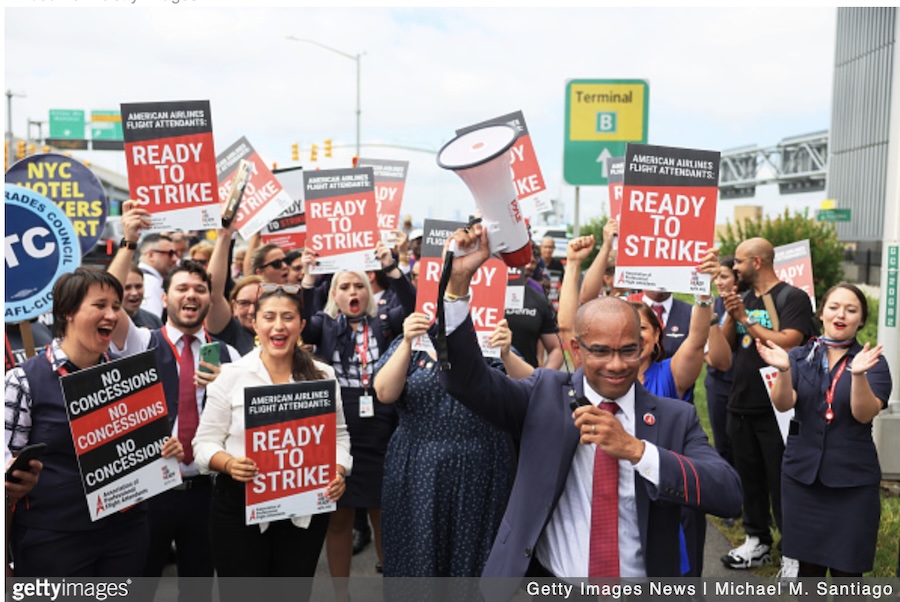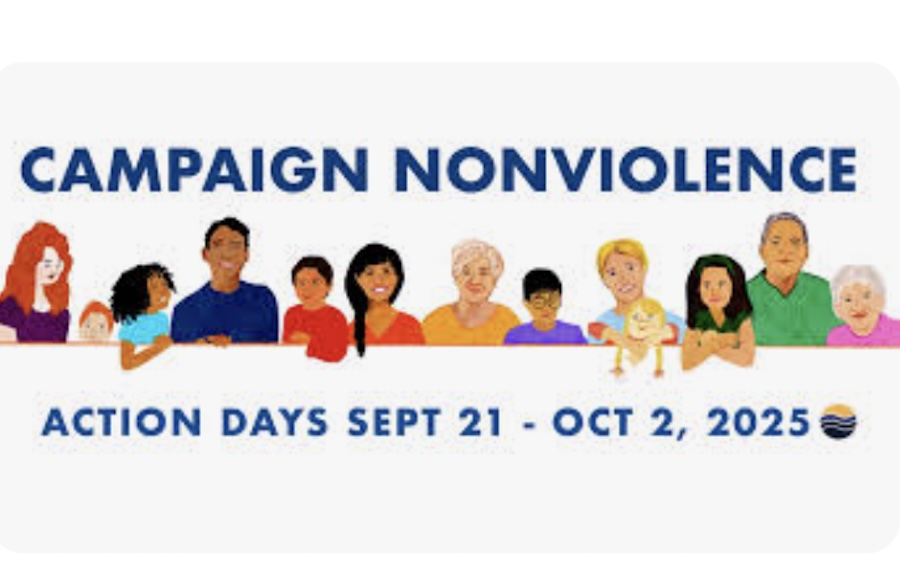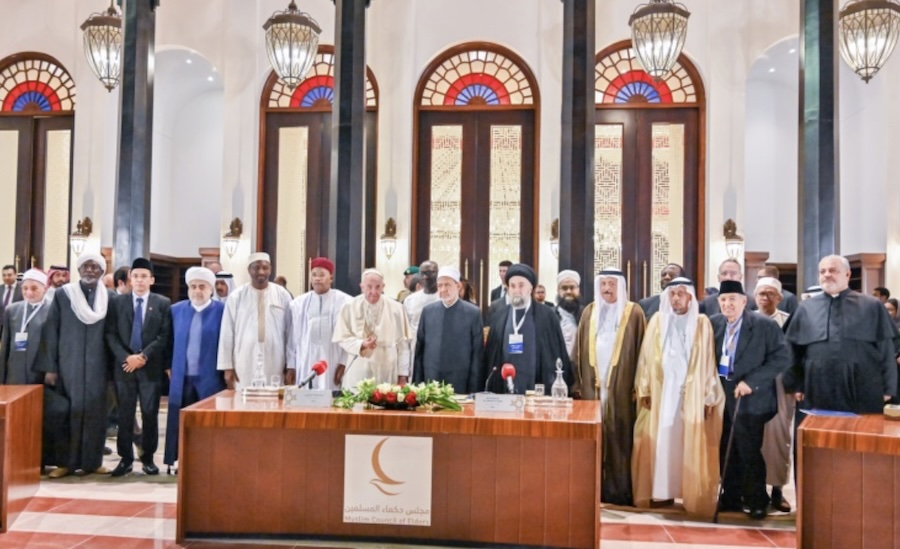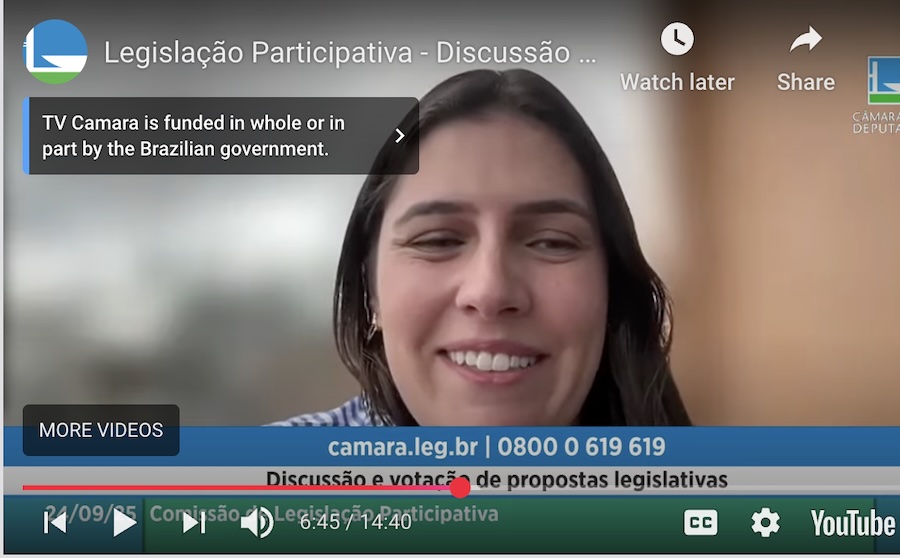. HUMAN RIGHTS .
An article by Jeremy Brecher from Waging Nonviolence
Something is in the air: A perception that American democracy and livable conditions for working people may only be saved by the kind of large-scale nonviolent direct action variously called “general strikes,” “political strikes,” or, as I will refer to all of them, “social strikes.”

Calls for mass disruptive action are coming from unlikely places, like Anthony Romero, executive director of the ACLU, an organization normally associated with legal action through the courts. When Romero was asked in a recent interview what would happen if the Trump administration systematically defied court orders, he replied, “Then we’ve got to take to the streets in a different way. We’ve got to shut down this country.”
Similarly senior Democratic Rep. Jim McGovern said, “We can’t just sit back and let our democracy just fall apart. What we need to think about are things like maybe a national strike across this country.”
Some in organized labor are also entering the fray. Sara Nelson, head of the Association of Flight Attendants, recently said that American workers — no matter what they do or what sector they are in — now have “very few options but to join together to organize for a general strike.” (She led the organizing for a national general strike that successfully deterred Trump’s attempt to shut down the government in his first term.)
Meanwhile, online, there are even more ad hoc efforts demonstrating the tactic’s appeal right now. For instance, more than 300,000 people have signed cards pledging to participate in a general strike.
Calling for general strikes is a staple of the radical toolkit. (I’ve made questionable efforts to call two or three myself over the past half-century.) But why has the idea of such mass actions suddenly appeared on the lips of such a wide range of people? There are three principal reasons:
1. The wide range of people being harmed by the MAGA juggernaut gives credibility to actions based on wide public participation.
2. The demolition of key institutions of democracy, constitutionalism and the rule of law is threatening to leave few alternatives to popular uprising.
3. The fecklessness of the leadership of the Democratic Party, as sublimely illustrated by Sen. Chuck Schumer’s passage in March of the devastating MAGA budget, has led to despair about resistance within the institutions of government.
These inescapable realities are forcing people to think in unaccustomed ways.
I use the term “social strikes” to describe mass actions people take to exercise power by withdrawing cooperation from and disrupting the operation of society. The goal of a social strike is to affect not just the immediate employer, but a political regime or social structure. Such forms of mass direct action provide a possible alternative when institutional means of action prove ineffective. In all their varied forms they are based on Gandhi’s fundamental perception that “even the most powerful cannot rule without the cooperation of the ruled.”
(Article continued in the right column)
The struggle for human rights, is it gathering force in the USA?
(Article continued from the left column)
What are social strikes?
Social strike is a broad term that encompasses a wide range of activities that use the withdrawal of cooperation and mass disruption to affect governments and social structures. While the U.S. has a tradition of social and labor movements using mass action and local general strikes, it does not have a tradition of using people power for the defense of democracy. However, in other countries where democratic institutions have been so weakened or eliminated that they provide no alternative to tyranny, such methods have been used effectively.
Tyrannical regimes from Serbia to the Philippines to Brazil and many other places have been brought down by nonviolent revolts that made society ungovernable. More recent examples include the “popular impeachment” of the governor of Puerto Rico in 2019 after the leaking of scurrilous discussions in a chat group by top government leaders and the massive uprisings that removed the president of Korea as he instigated a coup last December. In March 2025 alone there were general strikes in Belgium, Argentina, Serbia and Korea — all directed against government austerity policies or, in the case of Korea, unconstitutional seizure of government power.
Various kinds of social strikes have occurred in U.S. history. The U.S. has seen at least half-a-dozen phases of intense class conflict like those Rosa Luxemburg called “periods of mass strike.” These often involved popular action that went far beyond, though usually included, the withdrawal of labor power that conventionally define a strike. Mass strikes have included general strikes, mass picketing, occupation of workplaces and government buildings, nonviolent direct action, shutdowns of commerce, blocking of traffic and other disruption of everyday activities. Mass strikes have often been met with severe repression and at times involved violent conflict with company guards, police, state militias and the U.S. Army.
The U.S. has also seen a handful of actions that fit the classical definition of a “general strike” as a coordinated work stoppage by trade unions in many different sectors.
The closest the U.S. has come to a national general strike was in 1886, when a strike for the eight-hour day became a general strike in Chicago and some other locations. Since then there have been a handful of general strikes in individual cities, for example the Seattle general strike in 1919 and the general strikes in Oakland and Stamford, Connecticut in 1946. They have all been sympathetic strikes to support particular groups of workers in struggles with their employers.
Such union-called general strikes, however, have been a rarity in U.S. labor history. American unions are bound by laws specifically designed to prevent them from taking part in strikes about issues outside their own workplace, such as sympathy strikes and political strikes. In most cases their contracts include “no-strike” language that bans them from striking during the contract. Unions that violate these prohibitions are subject to crushing fines and loss of bargaining rights. Their leaders can be — and have been — packed off to jail.
Historically, American unions have often opposed their members’ participation in strikes that union officials have not authorized because they wished to exercise a monopoly of authority over their members’ collective action. In labor movement jargon, such unauthorized actions were condemned as “dual unionism.” U.S. unions have often disciplined and sometimes supported the firing and blacklisting of workers who struck without official authorization. As a result, unions have often deterred their members from participating in mass strike actions even when the rank and file wanted to.
– – – – – –
If you wish to make a comment on this article, you may write to coordinator@cpnn-world.org with the title “Comment on (name of article)” and we will put your comment on line. Because of the flood of spam, we have discontinued the direct application of comments.











